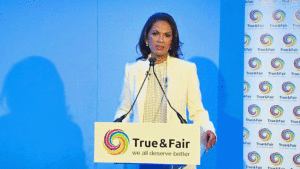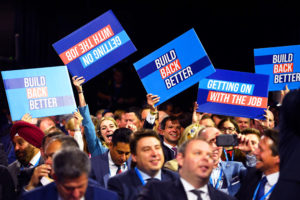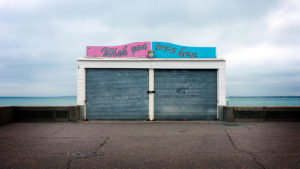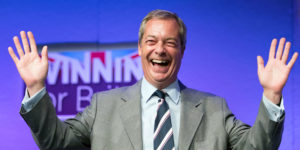Meet the teenage Nigel Farage. It’s the absurdly late Seventies. He is a stalwart of Dulwich College’s second XI cricket team, and a tittering purveyor of risqué racial banter. He likes snuff, golf, and brandishing a rolled-up umbrella at unsuspecting chums. He is advanced in his opinions, but delighted to play devil’s advocate for anyone else’s.
Stumblingly, young Nige is starting to live out the two contradictory impulses that will frame his life. One: a conservative’s respect for, and needy desire to be part of, institutions. Two: a libertarian’s outsider fantasy of bomb-tossing nonconformity. Yeah, the boy loves the club, but he quite fancies running a bulldozer through those front doors too. Luck will let him do both.
Nigel Farage, for all his talents, was lucky. He was time-and-place fortunate. His pampered enemies underestimated him, and thought him a punchline until the joke brought their house down. Many of them were no life experience professional political hermits like Danny Alexander or Ed Miliband. They raised no whirlwinds. Mostly, as David Foster Wallace put it, they weren’t “enough like human beings even to hate.” They were overpumped with focus-grouped shrewdness, not human instinct.
Farage was messily and chaotically human. He is, in that dreaded national formulation, a character. He has an anuran face, an aquatic aspect — the ideally fishy tribune of an island where the moss is still damp and the rain is still thin.
In the 2010s he smashed through the Overton Window like a breeze block. First with Ukip, then with the Brexit Party. And even as he did so, he was being very badly behaved — not that this ever made a scratch in his popular image as a plain-speaking common sense merchant. Fortune favours the charming miscreant sometimes. The rest was Britain’s exit from the European Union.
At least, that’s the life that emerges from Michael Crick’s new biography of Farage. One Party After Another: The Disruptive Life of Nigel Farage feels, quite simply, long. Five hundred beigely judicious pages read like 5,000. Crick’s annoyingly pokey reportorial style — a staple of Channel Four News for decades — is absent here. It’s a dull, reasonably objective attempt to tell the truth. There is voyeurism (we buy books like this to peep through the bedroom keyhole, don’t we?) but not a single nose-turning jab of biographical GBH.
Crick comes perilously close to making Farage… boring. He drowns him under mudslides of irrelevant detail. There are paceless accounts of infighting among Ukip’s National Executive Committee; a whole chapter about a dodgy party call centre in Kent; more information on Neil Hamilton’s time as an MEP than even the most deranged politico could be expected to digest. Still, sanding away the trivia reveals two major themes: alcohol and luck. In Farage’s life they combine and recombine like clouds on a windy day.
His luck was personal and political. Ukip’s rise was only possible after the unexpected death of the wall-eyed billionaire tyrant James Goldsmith in 1997. His demise took his Referendum Party, Ukip’s lavishly financed rival, into the soil with him. Tony Blair’s decision to approve a new proportional voting system for the UK’s European parliamentary elections gave Ukip their first big breaks — and Farage’s first media appearances proper — in 1999.
Later on, Farage was sceptical about the need for a referendum. Ukip’s central policy was so outrageously unthinkable for most of Farage’s career that, in spite of his crashingly loud public idealism, it seems like he doubted whether it could ever happen. His electoral successes (not luck) eventually pushed David Cameron into promising a vote on exiting the EU in 2013 — but it was Cameron’s unexpected majority in 2015 that made the referendum happen.
During the campaign, Farage had the lowest personal popularity rating of any of the major party leaders. Jeremy Corbyn was more popular. Farage did have political nous, though. Like Cummings, he understood that the old Left and Right labels were meaningless. “We don’t want to represent a wing,” he said in 2004, “but the heart and wishbone of the nation.” He didn’t think that English politics had changed since the 17th century. “You are either a cavalier, a democrat, and a libertarian, or you are a doctrinaire, morally intolerant roundhead.” He had identified one of the oldest, deepest, most durable divisions on the island. Spookily, the political map of the Brexit vote ended up resembling the regional distribution of support for the King, Court and Tories against Parliament, Merchants and Whigs in the Civil War. Except in 2016 the cavaliers won. Whoops.
For years, Ukip suffered from the pandemonium of being a party staffed entirely by cavaliers. Crick (without any sense of humour) gives the impression that the whole trembling structure could come crashing down at any moment. But Farage’s luck holds. The early Ukip days are clogged with writs, squabbles, and changes to office locks. The dramatis personae are livestock auctioneers, umbrella makers, undertakers, investment brokers, hoteliers, Rowan Atkinson’s brother, and a barrister described, in a simile that is too fun to be Crick’s, as “an escapee from a Joanna Trollope novel”. Tiny factions of them argue obscurely in the bitter wilderness.
Like Shakespearean fools, they tell unspeakable truths and babblingly predict a future others cannot see. The first full-length account of the party, Mark Daniels’ Cranks and Gadflies, described the membership as “idiots, paranoiacs, and conspiracy theorists.” Daniels — real name Mark Fitzgeorge-Parker — was also Ukip’s press officer at the time. Farage admitted they were all “bumbling amateurs”.
Peak bumble came in 2010. Farage was in Buckingham on polling day, where he was going to fail to win a seat in Westminster, again. It was planned as a photo-opportunity, which would have been a very Farage way to die. A blue Wilga 35A plane — “rather like a tractor” Farage thought — would pull a Ukip banner and its leader into the air, then fly low over Buckingham and the surrounding area. “I just hope the plane doesn’t blow up and crash,” Farage joked to the press at the airfield. Five attempts were required for the plane to pick up the banner. This quickly wrapped itself around the tail and rudder. Powerlessly, the plane began to drop from the forever English sky. “Oh, fuck!” said Farage.
He should have been buried. But he was pulled out bleeding from the sorrily pretzeled fuselage, and shakily tried to smoke a fag. This was the third time in his life he’d escaped death. At this point, some Brexiteers will see the hand of God at work. Remainers will mutter about Satanic power. If Farage had died in 2010, would Brexit have happened? Crick poses the question, then refuses to play around with it.
Clearly, Farage inspired voters who felt their plain lives were being mocked, and their succulent English liberties stolen. His public persona, all ebullient disrespect for starchy insider taboos and flashy Thatcherkind good time roller, was immensely appealing when set against Cameron, Miliband, and Clegg. Unlike them, as his aide Gawain Towler said, Farage spoke “fluent human”.
He told voters that over two decades in Britain there had been a “shocking widening of the class system, where the rich have got a lot richer and the poor are robbed of the opportunity to attain their best”. He was right. At times he seemed to hold England’s spleen in his hands, happy to squeeze its juices at his favourite targets: Westminster and Brussels.
Anger wasn’t going to be enough. Paradoxically, the better Farage did in the years before the referendum, the more support for his core mission dropped off. He only appealed to voters who already wanted to leave the EU; he alarmed soft-eurosceptics with his hard-edged rhetoric on migration and HIV; he energised pro-Europeans who saw him as an unholy mash-up of Wat Tyler and Adolf Hitler. As Dominic Cummings put it: “Farage put off millions of (middle class in particular) voters who wanted to leave the EU but who were very clear in market research that a major obstacle to voting Leave was ‘I don’t want to vote for Farage, I’m not like that.’” He made the Brexit vote possible, but if he had played the Boris Johnson role in the referendum, Leave would have lost.
Practically every page of One Party After Another opens with the clink of bottles. Acquaintances speak to Crick about Farage with the awe accorded to people who live larger and harder than the rest of us. Ann Widecombe recollects Farage rowdily leading Brexit Party MEP’s in song. Another describes Farage picking up a small coffee table and pretending to play the bagpipes with it. “His ability to get by on a few hours’ sleep,” says Aaron Banks, “even after his usual heavy nights, never ceases to amaze.”
It sounds like fun, and sometimes it was. But there was a desperate edge to Farage’s gregariousness. The plane crash had left him in immense pain, and ended his golfing days. His personal life, a thicket of chaotic amatory escapades and unhappy marriages, was broken. Crick quotes one Brexit Party insider who was surprised to find that Farage was “not actually very confident. He’s quite a tense person really, not at all relaxed.”
Alcohol gave him fluency, and let him escape himself. The sad, casual cruelty of all those affairs was not exposed in full before the referendum. Depending on the public’s mood, it may have ruined him. Or they may have been content, as they have been with Johnson, to ignore what Farage got up to on his night shifts. As it always seemed to, his luck held.
Crick’s biography is the first; it tells us how it happened, but doesn’t tell us why. Whether he saved the club, or made a colossal wreck of it remains uncertain. One Party After Another doesn’t have the answers. Crick claims that Farage is one of the most significant politicians of the last fifty years. His reason? “Nobody can dispute that Nigel Farage achieved his goal of leaving the European Union.” Well, duh.
Yes, he rode his luck, and he won. Farage is still agitating; he’s now a two-legged media empire; a pundit, a poster, a YouTuber. Crick leaves Farage on a boat in the channel, bathetically posed, eyes and cameras scanning the choppy waters for fighting-age men in listing dinghies.
Of all the 2010s populists — Le Pen, Bolsonaro, Salvini, Bannon, Trump, Wilders, Petry — only Farage actually got what he wanted. In the process, his two contradictory impulses have resolved themselves. The libertarian beat up the conservative. The bomb-thrower exploded several British institutions. But like a pinstriped Alexander, Farage has no more worlds to conquer. His victories have handed him obsolescence.
Disclaimer
Some of the posts we share are controversial and we do not necessarily agree with them in the whole extend. Sometimes we agree with the content or part of it but we do not agree with the narration or language. Nevertheless we find them somehow interesting, valuable and/or informative or we share them, because we strongly believe in freedom of speech, free press and journalism. We strongly encourage you to have a critical approach to all the content, do your own research and analysis to build your own opinion.
We would be glad to have your feedback.
Source: UnHerd Read the original article here: https://unherd.com





